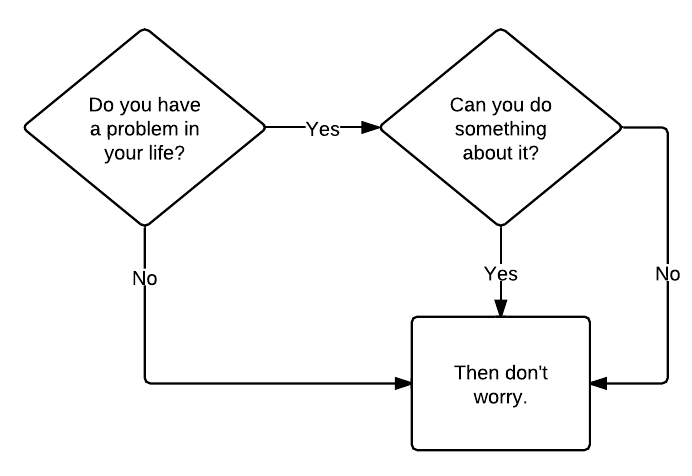Last week I wrote about some of the problems with delegating, but I stopped before I came to any solid advice. This was partly because I wanted to keep my post under 1000 words, but also because I wanted some time to think over the question I ended with.
How do we get closure when putting an unfinished task into someone else’s hands?
I don’t know that I really came to any good solid solutions on this, but I was able to break down the issue a little bit more. I hope that this is marginally helpful, but what is probably more helpful, is the reminder that the worry and lack of closure is ultimately YOUR problem. Delegation is something that YOU have to be okay with, and I don’t know that I can tell you how to do that. So what can I tell you?

Before we can answer the question of “how we get closure” we have to know “why do we not feel closure”?
I can only speak from personal experiences, but as people I would like to think we’re not all too different in regards to this.
The first reason you might not feel closure is a lack of trust. You need to trust the people helping you can get the job done. If you don’t trust them, A) why are they helping you, and B) you’ll never be at ease because you’ll be worried they won’t meet your expectations.
Trust takes time. It has to be earned. At an immediate level, this is very unhelpful because this doesn’t solve the problem of delegating now, though it might solve the problem of delegating later. If you know someone has had the proper training you’re more likely to trust them. Like trust, training takes time, especially if it needs to be “proper.”
This all walks a fine line between the things that you do and do not actually have control over. What happens when you can’t train, you don’t have time to train, and you need to blindly trust someone else to do something?
At times like this, there is only one thing you can do. Take a deep breath, say a prayer, and know that the world won’t end when things go wrong.1 (Probably.)2
I’m going to come back to the topic of training in the future, but now I want to talk about apathy.
Sometimes life needs a healthy dose of apathy.
apathy: (noun) lack of interest, enthusiasm, or concern.
Not all apathy is bad.
In our busy lives it is impossible for us to do everything that everyone (ourselves included) would like us to do. As such, it is unrealistic for us to expect ourselves to be able to do so. There are going to be many things that we just can’t do. You have to choose what is important for you to do and what you don’t have time for. If you don’t have time for something, but it needs to be done, you probably need to delegate it.
A lot of stuff needs to be delegated today. This should be something we all expect, and this is where the apathy comes in. In this context, apathy becomes knowledge that right or wrong, correctly done or not, someone else is taking care of this thing. If they do it wrong, they’ll just have to do it again. It’s not your problem.

“Yeah, but…”
As someone who likes to be in some semblance of control, this is not always very easy. But there are a few things you can do to help yourself.
The first step is to know the limit of your control. You can’t control what other people do. You can give them instruction, you can offer advice, you can describe your expectations, but ultimately, they will do things how they see fit. They will use their experience and knowledge in a way that makes sense to them to do what you asked. (Or at very least what they think you asked.)
At this point, there isn’t much of anything you can do. You have to learn to be okay with this. Once you are at peace with the limits of your control, things are mentally easier to delegate. If you have done the best you can to delegate, the responsibility is no longer with you.

“Yeah, but…”
Yes. Things may not be perfect, but it’s not the end of the world. You may still be “responsible” for something to happen or held accountable when it doesn’t. There are certainly tasks which don’t lend them well to delegating. There are tasks that probably shouldn’t be delegated, at least not to certain people, but that’s not what I’m trying to talk about.
When you pass along a task to someone else you have to pass along the task. The whole task. The reason we don’t get closure when we delegate is because we aren’t willing to give anything up. We’ll tell someone to do something, but we won’t let go of it mentally. You have to remove yourself from the process.
I did not define “delegate” in my last post, allow me to do so here.
Delegate: (verb) entrust (a task or responsibility) to another person
Entrust: (verb) assign the responsibility for doing something to (someone)
To properly delegate something you need to give it to someone and then put it out of your mind. You have to be willing to hold that person responsible if things don’t turn out as expected. Finally, you need to have the resolve to not get involved, even if things go amiss.

“Yeah, but…”
If you plan to get involved in order to fix something if things go wrong, and you feel that is a necessity, I would question your decision to delegate the task. If things are so mission critical that any error will require your direct involvement, either this is not a good task to delegate or you need to let go of the task.
The tricky part of this topic is that it is very nebulous. There’s a lot of exceptions to these “rules.”3 These suggestions don’t work in every situation, but what will work in every situation is a better mindset.
Becoming good at something takes practice. It takes practice to learn to delegate. Which brings us around to what I said at the start. What is probably most helpful, is the reminder that the worry and lack of closure is ultimately YOUR problem. Delegation is something that YOU have to be okay with, and I don’t know that I can tell you how to do that.4
1. Okay, that’s three things. ↩
2. If you’re in a situation where delegating something to an incompetent person could actually end the world then I would suggest rethinking the necessity of delegating the task and ask you to remember that I take no responsibility for people following the advice on my website when it comes to situations involving the life and death of humanity. ↩
3. There more what you’d call “guidelines” than actual rules. ↩
4. Delegate one thing this week. One thing. I dare you. Let me know if the world ends as a result. ↩